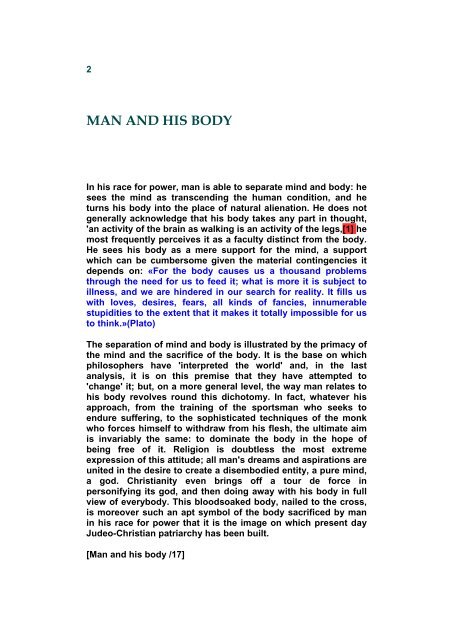emmanuel reynaud holy virility the social construction of masculinity
emmanuel reynaud holy virility the social construction of masculinity
emmanuel reynaud holy virility the social construction of masculinity
Create successful ePaper yourself
Turn your PDF publications into a flip-book with our unique Google optimized e-Paper software.
2<br />
MAN AND HIS BODY<br />
In his race for power, man is able to separate mind and body: he<br />
sees <strong>the</strong> mind as transcending <strong>the</strong> human condition, and he<br />
turns his body into <strong>the</strong> place <strong>of</strong> natural alienation. He does not<br />
generally acknowledge that his body takes any part in thought,<br />
'an activity <strong>of</strong> <strong>the</strong> brain as walking is an activity <strong>of</strong> <strong>the</strong> legs,[1] he<br />
most frequently perceives it as a faculty distinct from <strong>the</strong> body.<br />
He sees his body as a mere support for <strong>the</strong> mind, a support<br />
which can be cumbersome given <strong>the</strong> material contingencies it<br />
depends on: «For <strong>the</strong> body causes us a thousand problems<br />
through <strong>the</strong> need for us to feed it; what is more it is subject to<br />
illness, and we are hindered in our search for reality. It fills us<br />
with loves, desires, fears, all kinds <strong>of</strong> fancies, innumerable<br />
stupidities to <strong>the</strong> extent that it makes it totally impossible for us<br />
to think.»(Plato)<br />
The separation <strong>of</strong> mind and body is illustrated by <strong>the</strong> primacy <strong>of</strong><br />
<strong>the</strong> mind and <strong>the</strong> sacrifice <strong>of</strong> <strong>the</strong> body. It is <strong>the</strong> base on which<br />
philosophers have 'interpreted <strong>the</strong> world' and, in <strong>the</strong> last<br />
analysis, it is on this premise that <strong>the</strong>y have attempted to<br />
'change' it; but, on a more general level, <strong>the</strong> way man relates to<br />
his body revolves round this dichotomy. In fact, whatever his<br />
approach, from <strong>the</strong> training <strong>of</strong> <strong>the</strong> sportsman who seeks to<br />
endure suffering, to <strong>the</strong> sophisticated techniques <strong>of</strong> <strong>the</strong> monk<br />
who forces himself to withdraw from his flesh, <strong>the</strong> ultimate aim<br />
is invariably <strong>the</strong> same: to dominate <strong>the</strong> body in <strong>the</strong> hope <strong>of</strong><br />
being free <strong>of</strong> it. Religion is doubtless <strong>the</strong> most extreme<br />
expression <strong>of</strong> this attitude; all man's dreams and aspirations are<br />
united in <strong>the</strong> desire to create a disembodied entity, a pure mind,<br />
a god. Christianity even brings <strong>of</strong>f a tour de force in<br />
personifying its god, and <strong>the</strong>n doing away with his body in full<br />
view <strong>of</strong> everybody. This bloodsoaked body, nailed to <strong>the</strong> cross,<br />
is moreover such an apt symbol <strong>of</strong> <strong>the</strong> body sacrificed by man<br />
in his race for power that it is <strong>the</strong> image on which present day<br />
Judeo-Christian patriarchy has been built.<br />
[Man and his body /17]
















